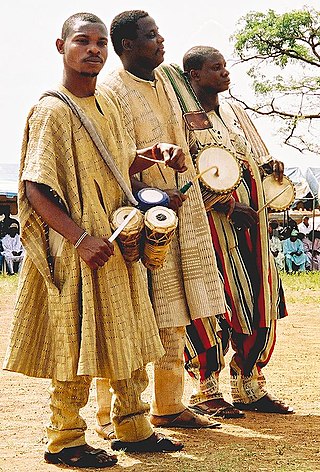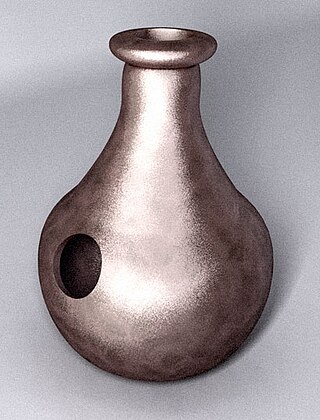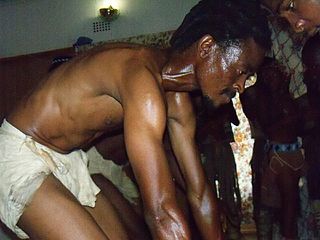Related Research Articles

Bluegrass music is a genre of American roots music that developed in the 1940s in the Appalachian region of the United States. The genre derives its name from the band Bill Monroe and the Blue Grass Boys. Like mainstream country music, it largely developed out of old-time string music, though in contrast, it is traditionally played exclusively on acoustic instruments and also has roots in traditional English, Scottish and Irish ballads and dance tunes, as well as in blues and jazz. It was further developed by musicians who played with Monroe, including 5-string banjo player Earl Scruggs and guitarist Lester Flatt. Monroe characterized the genre as "Scottish bagpipes and ole-time fiddlin'. It's a part of Methodist, Holiness and Baptist traditions. It's blues and jazz, and it has a high lonesome sound."

Religious music is a type of music that is performed or composed for religious use or through religious influence. It may overlap with ritual music, which is music, sacred or not, performed or composed for or as ritual. Religious songs have been described as a source of strength, as well as a means of easing pain, improving one's mood, and assisting in the discovery of meaning in one's suffering. While style and genre vary broadly across traditions, religious groups still share a variety of musical practices and techniques.

As it is in other countries, the music in Tanzania is constantly undergoing changes, and varies by location, people, settings and occasion. The five music genres in Tanzania, as defined by BASATA are, ngoma, dansi, kwaya, and taarab, with bongo flava being added in 2001. Singeli has since the mid-2000s been an unofficial music of uswahilini, unplanned communities in Dar es Salaam, and is the newest mainstream genre since 2020.

The music of Nigeria includes many kinds of folk and popular music. Little of the country's music history prior to European contact has been preserved, although bronze carvings dating back to the 16th and 17th centuries have been found depicting musicians and their instruments. The country's most internationally renowned genres are Indigenous, Apala, Aurrebbe music, Rara music, Were music, Ogene, Fuji, Jùjú, Afrobeat, Afrobeats, Igbo highlife, Afro-juju, Waka, Igbo rap, Gospel, and Yo-pop. Styles of folk music are related to the over 250 ethnic groups in the country, each with their own techniques, instruments, and songs. The largest ethnic groups are the Igbo, Hausa and Yoruba. Traditional music from Nigeria and throughout Africa is often functional; in other words, it is performed to mark a ritual such as the wedding or funeral and not to achieve artistic goals. Although some Nigerians, especially children and the elderly, play instruments for their own amusement, solo performance is otherwise rare. Music is closely linked to agriculture, and there are restrictions on, for example, which instruments can be played during different parts of the planting season.

The Igbo people are an ethnic group in Nigeria. They are primarily found in Abia, Anambra, Ebonyi, Enugu, and Imo States. A sizable Igbo population is also found in Delta and Rivers States. Ethnic Igbo populations are found in Cameroon, Gabon, and Equatorial Guinea, as migrants as well as outside Africa. There has been much speculation about the origins of the Igbo people, which are largely unknown. Geographically, the Igbo homeland is divided into two unequal sections by the Niger River—an eastern and a western section. The Igbo people are one of the largest ethnic groups in Africa.

Music of Punjab reflects the traditions of the Punjab region of the Indian subcontinent, associated with Punjabi language. Punjab is currently divided into two parts: East Punjab, in India, and West Punjab, the most populous province of Pakistan. The Punjab has diverse styles of music, ranging from folk and Sufi to classical, notably the Patiala gharana. Contemporary Punjabi music has tended to include more modern hip-hop and R&B sounds. While this style of music is obviously most popular in Punjab, it has seen popularity across the subcontinent and areas with large Punjabi diaspora populations, such as Canada, the United Kingdom, and the United States.
Fújì is a popular Yoruba musical genre. It arose from the improvisational wéré music, also known as ajísari, a genre of music performed to wake Muslims before dawn during the Ramadan fasting season. Alhaji Sikiru Ayinde Barrister popularized wéré music during the 1950s and 60s and conceived the term "fújì" in an unusual way. According to Barrister, "I came up with it when I saw a poster at an airport, advertising the Mount Fuji, which is the highest peak in Japan." Fújì should not be mistaken for the Yorùbá words "fuja" or "faaji," which mean leisure or enjoyment.
Apala is a music genre originally developed by the Yoruba people of Nigeria, during the country's history as a colony of the British Empire. It is a percussion-based style that originated in the late 1930s. The rhythms of apala grew more complex over time, and have influenced the likes of Cuban music, whilst gaining popularity in Nigeria. It has grown less religious centered over time.

Yoruba music is the pattern/style of music practiced by the Yoruba people of Nigeria, Togo, and Benin. It is perhaps best known for its extremely advanced drumming tradition and techniques, especially using the gongon hourglass shape tension drums. Yoruba folk music became perhaps the most prominent kind of West African music in Afro-Latin and Caribbean musical styles; it left an especially important influence on the music used in Santería practice and the music of Cuba.

Igbo music is the music of the Igbo people, who are indigenous to the southeastern part of Nigeria. The Igbo traditionally rely heavily on percussion instruments such as the drum and the gong, which are popular because of their innate ability to provide a diverse array of tempo, sound, and pitch. Igbo music is generally lively, upbeat, and spontaneous which creates a variety of sounds that enables the Igbo people to incorporate music into almost all the facets of their daily lives. Some very popular Igbo musical styles are Igbo highlife, Ogene, Igbo gospel.
Greek traditional music includes a variety of Greek styles played by ethnic Greeks in Greece, Cyprus, Australia, the United States and other parts of Europe. Apart from the common music found generally in Greece, each region of Greece contains a distinct type of folk music that originated from the region due to their history, traditions and cultural influences.
Muziki wa dansi, or simply dansi, is a Tanzanian music genre, derivative of Congolese soukous and Congolese rumba. It is sometimes called Swahili jazz because most dansi lyrics are in Swahili, and "jazz" is an umbrella term used in Central and Eastern Africa to refer to soukous, highlife, and other dance music and big band genres. Muziki wa dansi can also be referred to as Tanzanian rumba, as "african rumba" is another name for soukous.
A music genre is a conventional category that identifies some pieces of music as belonging to a shared tradition or set of conventions. Genre is to be distinguished from musical form and musical style, although in practice these terms are sometimes used interchangeably.

Ogene is a style of Igbo music consisting of, and taking its name from, the ogene instrument, which is a large metal bell. The Ogene instrument has historically been made by the Igbo people of Nigeria. It is one of the most important metal instruments of the people.

Igbo art is any piece of visual art originating from the Igbo people. The Igbo produce a wide variety of art including traditional figures, masks, artifacts and textiles, plus works in metals such as bronze. Artworks from the Igbo have been found from as early as 9th century with the bronze artifacts found at Igbo Ukwu. With processes of colonialism and the opening of Nigeria to Western influences, the vocabulary of fine art and art history came to interact with established traditions. Therefore, the term can also refer to contemporary works of art produced in response to global demands and interactions.
Popular music is music with wide appeal that is typically distributed to large audiences through the music industry. These forms and styles can be enjoyed and performed by people with little or no musical training. It stands in contrast to both art music and traditional or "folk" music. Art music was historically disseminated through the performances of written music, although since the beginning of the recording industry, it is also disseminated through recordings. Traditional music forms such as early blues songs or hymns were passed along orally, or to smaller, local audiences.
Igbo highlife is a contemporary musical genre which combines highlife and Igbo traditional music. It first started off in the southeast region of Nigeria, during the 1920s. The genre is primarily guitar-based music, with a rare characteristic blend of horns and vocal rhythms. Igbo highlife lyrics are sung mostly in Igbo with occasional infusion of Pidgin English. One of the most influential composers and performers of the music is Chief Stephen Osita Osadebe whose career spanned over 40 years. Osadebe's discography comprises numerous popular songs including the 1984 hit "Osondi Owendi" which launched him on the world stage as a pioneer of the Igbo highlife genre.
Peter James Leonard Klatzow was a South African composer and pianist.

Tsutsube is a traditional dance and accompanying music in Botswana which is practiced by Basarwa or San people. Tsutsube is performed in four ritualistic categories or stages which are the first kill, puberty, marriage and trance. According to the history, the first kill was for males or boys, and trance dance was for healing purposes to engage ancestors spirits.
References
- ↑ Onwuegbuna, Ikenna Emmanuel (March 1, 2015). "Philosophical Embodiments in Igbo Music: An Analysis of Mike Ejeagha's "Popular" Folk Songs Style". SAGE Open. 5 (1): 215824401556966. doi: 10.1177/2158244015569667 . ISSN 2158-2440.
- ↑ Igwebuike, Ebuka Elias (January 2, 2017). "Metaphor, Identity and Ideologies in Igbo Folk Music". Muziki. 14 (1): 62–77. doi:10.1080/18125980.2017.1322471. ISSN 1812-5980.
- ↑ Africa, B. I. (July 22, 2022). "Egwu Ekipili, the Igbo Music Genre, you didn't know existed". Business Insider Africa. Retrieved December 17, 2023.
- ↑ Africa, B. I. (July 22, 2022). "Egwu Ekipili, the Igbo Music Genre, you didn't know existed". Business Insider Africa. Retrieved December 17, 2023.
- ↑ Onwuegbuna, Ikenna Emmanuel (March 1, 2015). "Philosophical Embodiments in Igbo Music: An Analysis of Mike Ejeagha's "Popular" Folk Songs Style". SAGE Open. 5 (1): 215824401556966. doi: 10.1177/2158244015569667 . ISSN 2158-2440.
- ↑ Onwuegbuna, Ikenna Emmanuel (March 1, 2015). "Philosophical Embodiments in Igbo Music: An Analysis of Mike Ejeagha's "Popular" Folk Songs Style". SAGE Open. 5 (1): 215824401556966. doi: 10.1177/2158244015569667 . ISSN 2158-2440.
- ↑ Igwebuike, Ebuka Elias (2017). "Metaphor, Identity and Ideologies in Igbo Folk Music". Muziki. 14 (1): 62. ISSN 1812-5980.
- ↑ Africa, B. I. (July 22, 2022). "Egwu Ekipili, the Igbo Music Genre, you didn't know existed". Business Insider Africa. Retrieved December 18, 2023.
- ↑ Igwebuike, Ebuka Elias (2017). "Metaphor, Identity and Ideologies in Igbo Folk Music". Muziki. 14 (1): 62. ISSN 1812-5980.
- ↑ Igwebuike, Ebuka Elias (2017). "Metaphor, Identity and Ideologies in Igbo Folk Music". Muziki. 14 (1): 62. ISSN 1812-5980.
- ↑ Igwebuike, Ebuka Elias (2017). "Metaphor, Identity and Ideologies in Igbo Folk Music". Muziki. 14 (1): 62. ISSN 1812-5980.
- ↑ Onwuegbuna, Ikenna Emmanuel (March 1, 2015). "Philosophical Embodiments in Igbo Music: An Analysis of Mike Ejeagha's "Popular" Folk Songs Style". SAGE Open. 5 (1): 215824401556966. doi: 10.1177/2158244015569667 . ISSN 2158-2440.
- ↑ Igwebuike, Ebuka Elias (2017). "Metaphor, Identity and Ideologies in Igbo Folk Music". Muziki. 14 (1): 62. ISSN 1812-5980.
- ↑ Igwebuike, Ebuka Elias (2017). "Metaphor, Identity and Ideologies in Igbo Folk Music". Muziki. 14 (1): 62. ISSN 1812-5980.